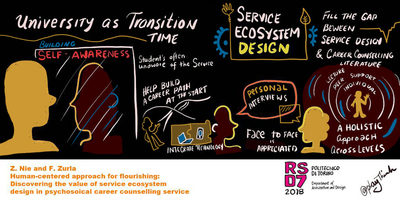Human-centered approach for flourishing: discovering the value of service ecosystem design in psychosocial career counselling service
Nie, Zichao and Zurlo, Francesco (2018) Human-centered approach for flourishing: discovering the value of service ecosystem design in psychosocial career counselling service. In: Proceedings of RSD7, Relating Systems Thinking and Design 7, 23-26 Oct 2018, Turin, Italy.
Preview |
Text
Nie_Slides_2018.pdf Download (194kB) | Preview |
![Nie_MM_2018.jpg [thumbnail of Nie_MM_2018.jpg]](https://openresearch.ocadu.ca/2732/2.hassmallThumbnailVersion/Nie_MM_2018.jpg)  Preview |
Image
Nie_MM_2018.jpg Download (143kB) | Preview |
Abstract
University students are becoming more and more fragile under the new circumstances of socio- economic climate, subjective factors, increasingly diverse student population and the strong presence of their parents It is much more difficult for them to manage their campus life, containing academic performance, social support, psychological well-being, or financial pressures, in a new environment. The problem of adapting the way of university life and directing their future in a positive way is raising. The latest report from National College Health Assessment indicated that over half of students have these fragile feelings, such as hopeless (53.1%), overwhelming by all you had to do (86.9%), Exhausted (not from physical activity, 83.4%), very lonely (64.4%), very sad (68.1%), overwhelming anxiety (61.4%) and so on (ACHA,2017). Besides, Career-related Issue (24.2%) is the one of the main difficulties for undergraduates to handle within the last 12 months. These negative emotions and issues effect the students’ flourishing in life.
In this scenario, the Psychosocial Career Counselling Service (PCCS) is a corresponding solution for students to reach flourishing in the campus ecology and social ecology. The aim of this service is to improve students’ decision-making skills, communicating skills, the self-concept, and other coping strategies (Naicker,1994), It supports individuals to understand and discover themselves so as to become self-directing (Shertzer & Stone, 1981). The career trajectory has a serious impact on human flourishing, and it affects people’s every single day into varying extents, such as social circles, a marriage partner, holiday plans, retirement possibilities (Krumboltz, 1993). However, the critical weakness in career related services at university is in the absence of perception from students. The study from Engelland, Workman, & Singh (2000), was conducted in three universities and analyzed the both perspectives from undergraduate clients and career service staffs. It showed that the three of the five service quality gaps in campus were derived from the lack of understanding student expectations.
The objective of this study is to explore what are the improvements of PCCS from student perspective and how service design can contribute to this service in a cross-cultural context. It is a collaborative research and conducts with a psychologist who is in charge of PCCS at university. Therefore, it combines the knowledge from design discipline and psychology field. The methodology strategy of this research is Case Study to understand what are the service improvements from human-centered approaches, and build service maps from institution documents. Two national universities, that one is in China and another is in Italy, has been chosen and the unit of analysis is the PCCS center for each case. The research target is first-year undergraduate student from different disciplines. The reason of studying on freshmen is that they experience the transition time from high school to campus life. In this period, they suffer a stressful and anxious time while they build new psychological identities (Skahill,2002), and the common “freshman blues” can escalate into fragility, when students start their adulthood and live on their own (Ruiz,2017). The methods are in-depth interview, open- ended questionnaire, and documentation.
In China, this exploratory study collected 32 interviews that last around 40 mins to 60 mins. Besides, open-ended questionnaire elicitation resulted in 553 responses in total and 549 for the valid responses. The intent of the mixed method research was to apply the qualitative questionnaires to explore and make sense in a wider range of the qualitative findings. In Italy, there were collected 32 interviews that in the same time range from 40 mins to 60 mins. In addition, there were 487 responses in open- ended questionnaire and 267 for the valid responses. The method of data analysis is thematic analysis- 6 steps (Braun & Clarke,2006). The findings from the two countries emerged a connection between service improvements and the service ecosystem, since the institution system, education policy, culture, and social environment are different. It entails five nested social systems- microsystem, mesosystem, exosystem, macrosystem and ecosystem (Jones, 2017) to improve the service quality in a holistic vision.
With both theoretical and empirical explorations, an inter-disciplinary approach for service ecosystem design of the campus PCCS for first-year students are emerged. In addition, it puts forward a robust conceptual service design output, which demonstrates its high potential to benefit human flourishing. It discloses for the academia and practitioners both in design and health field an opportunity to see the service ecosystem design for people’s wellbeing in intercultural background, which based on human-centered design logic in order to consider PCCS improvements from new insights, which involves students in an active role for creating the service in an initial step, which is a new collaborative way in PCCS to make a common ground for service design from both design and psychology, which provides an integrated outcome for the general situation and the particular cultural diversities.
| Item Type: | Conference/Workshop Item (Lecture) |
|---|---|
| Uncontrolled Keywords: | Service Design, Human-Centered Approach, service ecosystem, Psychological Wellbeing, Career Counselling Service, First-year Student, University |
| Related URLs: | |
| Date Deposited: | 10 Jul 2019 21:32 |
| Last Modified: | 20 Dec 2021 16:09 |
| URI: | https://openresearch.ocadu.ca/id/eprint/2732 |
Actions (login required)
 |
Edit View |

 Lists
Lists Lists
Lists